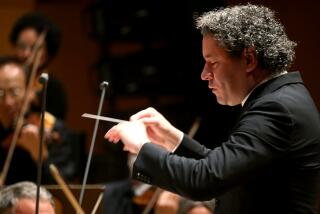Pure delight in Ligeti’s third volume
The Ligeti Project III: Cello Concerto, “Clocks and Clouds,” Violin Concerto, “Sippal, Dobbal, Nadihegeduvel.”
Siegfried Palm, cello. Katalin Karolyi, mezzo-soprano. Frank Peter Zimmermann, violin. Asko/Schoenberg Ensemble. Reinbert de Leeuw, conductor. (Teldec)
****
The third volume in Teldec’s wonderful Ligeti Project, which the company took over from Sony after eight issues, this disc collects works ranging from the mid-1960s to a song cycle based on poems by Sandor Weores composed in 2000. Each one gives occasion to revel in a unique sculptural sound world and distinctive creative voice. Palm expertly plays the taut, experimental Cello Concerto written for him in 1966. “Clocks and Clouds,” from 1973, creates a haunting, numinous unseen world. Zimmermann is the fluent soloist in the luminous (1990-92) Violin Concerto. Mezzo-soprano Karolyi is playful and acerbic in the witty “Sippal, Dobbal, Nadihegeduvel” song cycle.
-- Chris Pasles
String quartets and art of noise
Elliott Sharp: String Quartets, 1986-1996
Meridian String Quartet, Soldier String Quartet. (Tzadik)
** 1/2
As a guitarist, bandleader and composer-thinker, Sharp has long insisted on stirring together new music savvy, a certain punkish attitude and the art of noise, so it’s not surprising to find him stretching conventions in the realm of string quartet writing. Most of the tracks are performed by the Soldier String Quartet, composed of sympathetic NYC downtowners, ever game for experiments. Sharp likes to cross genre boundaries. He mixes a brutish minimal pulse with nervous rock energy and gruff string tone in the mad, driving “Tesselation Row” and “Hammer Anvil Stirrup.” Also encountered are frenetic bowings, sudden dynamic shifts and occasional chaotic noise schemes (in “Diurnal”), as well as the seductive percussive sonorities of “Digital,” an improvised and close-miked pizzicato groover. Suffice it to say, Sharp’s ideas of what flies in a string quartet setting are a world away from Haydn and even from the Kronos Quartet’s accessible musical worldview.
-- Josef Woodard
Revisiting a favorite of yore
Reinhold Gliere: Symphony No. 3 (“Ilya Murometz”)
London Symphony Orchestra, Leon Botstein, conductor. (Telarc)
***
This massive, hyper-Romantic program symphony from 1911 used to be popular on records -- usually in versions that slashed as much as 50% of the score. But with the passing of advocates like Eugene Ormandy and Leopold Stokowski, it dropped almost out of sight, only to resurface in the 1990s with multiple complete recordings. One can pass the time picking apart the influences -- the Scriabin longueurs of the second movement, the Rachmaninoff-like Russian tunes of the third, the Richard Strauss armaments in the fourth -- yet it makes a big cumulative impression. Here, Botstein races through the complete work in an exceptionally fast 72 minutes (it can take as long as 92). Along the way, he misses some opportunities for heightened dramatic tension, but Telarc’s engineers take what he gives them and pass it along spectacularly.
-- Richard S. Ginell
Much to admire, yet not enough
John Tavener: “The Bridegroom” and other works
Anonymous 4 and the Chilingirian Quartet (Harmonia Mundi USA)
**
Sad chants. Mournful cadences. Unclear words. This sometimes dreary disc achieves its high point with the world premiere recording of a new 17-minute piece, “The Bridegroom,” based on the parable of the wise and foolish virgins. It is an attractive, modestly dissonant but expressive piece written for these eight singers and instrumentalists, who give it authority and an understated passion. The other contents of this project emerge superficially neat and clean. Still, performances by Anonymous 4 tend to resemble the aural equivalent of synchronized swimming. Once the observer has admired the technical freedom and expertise of the executants, the thought occurs: Is this all there is?
-- Daniel Cariaga
More to Read
The biggest entertainment stories
Get our big stories about Hollywood, film, television, music, arts, culture and more right in your inbox as soon as they publish.
You may occasionally receive promotional content from the Los Angeles Times.










